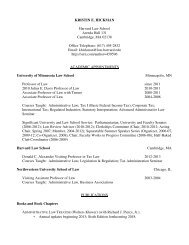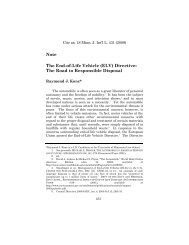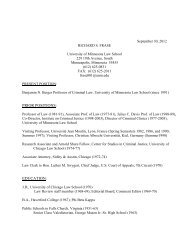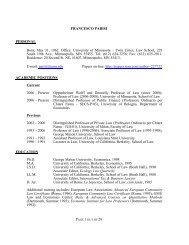Enabling Private Ordering - the University of Minnesota Law School
Enabling Private Ordering - the University of Minnesota Law School
Enabling Private Ordering - the University of Minnesota Law School
You also want an ePaper? Increase the reach of your titles
YUMPU automatically turns print PDFs into web optimized ePapers that Google loves.
58 MINNESOTA JOURNAL OF INT’L LAW [Vol. 18:1<br />
contractual arrangements under national and international law<br />
and aimed at remedying <strong>the</strong> lack <strong>of</strong> effective dispute resolution<br />
mechanisms in investor-State contracting. They were designed<br />
and intended to remedy <strong>the</strong> blind spots that <strong>the</strong> dualist<br />
framework created by separating <strong>the</strong> contractual bond between<br />
host State and investor from contract protection under<br />
international law. As such, <strong>the</strong>y were not intended as a purely<br />
declaratory clarification <strong>of</strong> customary international law to <strong>the</strong><br />
effect that contractual rights could form <strong>the</strong> object <strong>of</strong> an<br />
expropriation, but intended to stabilize investor-State<br />
cooperation more comprehensively against any form <strong>of</strong> ex post<br />
opportunistic behavior <strong>of</strong> <strong>the</strong> host State by allowing for effective<br />
third-party dispute settlement.<br />
The historic perspective, in o<strong>the</strong>r words, seamlessly fits in<br />
with understanding umbrella clauses as breaking with <strong>the</strong><br />
dualist framework <strong>of</strong> international law and providing an<br />
enforcement mechanism for host State promises, independent <strong>of</strong><br />
whe<strong>the</strong>r breaches were <strong>of</strong> a sovereign or a commercial nature.<br />
The restrictive approach to <strong>the</strong> interpretation <strong>of</strong> umbrella<br />
clauses <strong>the</strong>refore disregards not only <strong>the</strong> importance <strong>of</strong><br />
enforcement <strong>of</strong> host State promises for efficient investor-State<br />
cooperation, but also <strong>the</strong> historic evidence that general<br />
international law and <strong>the</strong> precursors <strong>of</strong> modern-day umbrella<br />
clauses have never understood <strong>the</strong> national/international law<br />
divide as a dogma that could not be surmounted by treaty<br />
provisions that ei<strong>the</strong>r submitted contract claims to international<br />
dispute resolution or contained provisions that transformed <strong>the</strong><br />
observance <strong>of</strong> such promises into a treaty obligation under<br />
international law.<br />
IV. THE EFFECT OF UMBRELLA CLAUSES ON INVESTOR-<br />
STATE RELATIONS<br />
The previous section argued that <strong>the</strong> function <strong>of</strong> umbrella<br />
clauses consists in providing a forum for settling disputes about<br />
breaches <strong>of</strong> investment-related promises by host States vis-à-vis<br />
foreign investors independent <strong>of</strong> whe<strong>the</strong>r such breaches arise<br />
from sovereign or commercial conduct <strong>of</strong> <strong>the</strong> State. A different<br />
issue is, however, <strong>the</strong> question <strong>of</strong> what effect, if any, umbrella<br />
clauses have on <strong>the</strong> content <strong>of</strong> <strong>the</strong> relationship between investor<br />
and host State. This concerns <strong>the</strong> influence <strong>of</strong> umbrella clauses<br />
on <strong>the</strong> substantive obligations <strong>of</strong> <strong>the</strong> parties to an investor-State<br />
contract and <strong>the</strong> relationship between investment treaty
















